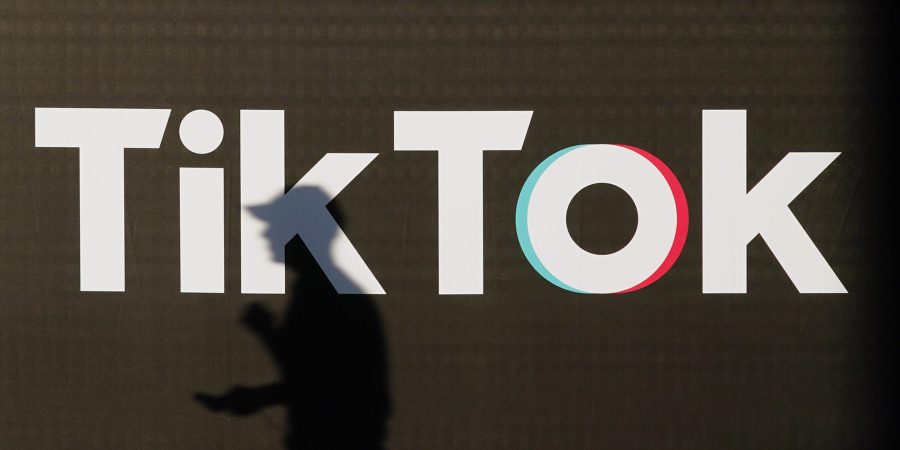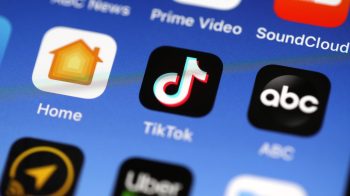What a TikTok ban would mean for free speech and data privacy

On Wednesday, members of the House of Representatives proved they actually can agree on something. In a bipartisan vote, lawmakers passed a bill that would force TikTok to split from its Chinese owner ByteDance or face a nationwide ban — the first for a social media app in the U.S.
President Joe Biden has signaled he’d sign the bill into law if it passes the Senate.
Advocates of the legislation argue that the Chinese government could use the hugely popular app to collect Americans’ personal data, which it could wield as a tool to threaten U.S. security.
Marketplace’s Lily Jamali spoke to Jameel Jaffer, executive director of the Knight First Amendment Institute at Columbia University, about the House’s action. As Jaffer points out, a little something called the First Amendment — the one about free speech and access to information — could complicate this crackdown.
The following is an edited transcript of their conversation.
Jameel Jaffer: The practice of restricting citizens’ access to foreign information and ideas and foreign media has historically been associated with authoritarian regimes. Authoritarian regimes all over the world restrict their citizens’ access to information from abroad in order to hold on to their own power. That fact is reason enough for us to be wary about going down this road, but the bigger reason, I think, to reject this idea is that it would be ineffective. The same kind of information that TikTok collects about its users is available to anybody who wants to buy it on the open market from data brokers and data aggregators. If China wants data about Americans, it has many ways to get that data that don’t involve TikTok. So, this bill is going to be ineffective. And at the same time, it restricts Americans from accessing a platform that is one of the most popular communications platforms in the world.
Lily Jamali: Which you argue is a violation of the First Amendment rights of Americans.
Jaffer: I do argue that it’s a violation of the First Amendment rights of Americans, and I have Supreme Court case law to point to. Less than a decade ago, in a case called Packingham v. North Carolina, the Supreme Court held that the First Amendment protects Americans’ right to access social media platforms. And 50 years ago, in a case called Lamont v. Postmaster General, the court held that the First Amendment protects Americans’ right to access foreign propaganda. That was a case involving Americans who wanted to subscribe to communist propaganda from abroad. They were receiving it by mail, and there was a federal law that required them to register with the post office in order to receive that information. So you were still allowed to get the information, but you had to register your name with the post office in order to do it. And the Supreme Court struck down that law as an impermissible attempt by Congress to burden the receipt of ideas, Americans’, you know, right to receive ideas from abroad. And that was a case in which it was undisputed that what Americans were trying to get from abroad was communist propaganda. The facts here are more complicated. Yes, it’s true TikTok is owned by ByteDance, which is headquartered in China. The Chinese government has a lot of influence with companies that are headquartered there. But nobody is arguing that TikTok is just Chinese propaganda. And yet, in a case that was decided half a century ago, the Supreme Court said, even when it’s uncontested that what Americans are trying to receive from abroad is communist propaganda, they have a First Amendment right to do so.
Jamali: So, get specific with me — with the way that this proposed law approaches TikTok. What in your view is the most egregious violation of First Amendment rights?
Jaffer: Well, this law restricts Americans access to this foreign social media platform, and for that reason, it implicates the First Amendment. It doesn’t mean that Congress can’t regulate that right, and it doesn’t mean that under no circumstances could Congress ban Americans from accessing TikTok. But, you know, the fact that the First Amendment protects Americans’ right to access social media means that Congress can’t impose restrictions without good reasons. And so, any court that is confronted with this question of whether this bill violates the First Amendment will ask, are there good reasons for this ban? And I think the fact that the ban doesn’t actually meaningfully constrain the ability of the Chinese government to collect information about Americans will be fatal to the ban in, in court. If Congress were really interested in constraining the Chinese government’s ability to access Americans data, the way to do it is to pass a privacy law that restricts what TikTok can collect, restricts what other social media platforms can collect, and restricts the ability of data aggregators and data brokers to share and sell Americans’ information to foreign countries or maybe to anybody.
Jamali: Let’s talk about the politics of this too. What do you make of this proposal coming in the middle of an election year? Our politics are already very volatile as it is. On the other hand, some argue it’s especially important right now to cap the influence of a platform like TikTok.
Jaffer: I think that it’s important to think about the risk of misinformation and disinformation in advance of an election and how we should protect ourselves against those risks. I think that all that is legitimate. I don’t think at the end of the day we can answer the question or the risk of misinformation or disinformation by investing the government with the authority to decide which ideas we have access to. This is a point that goes beyond TikTok. There’s all sorts of misinformation and disinformation out there on social media platforms, in newspapers, on cable TV, and addressing the risks of misinformation and disinformation is a complicated thing. But one thing that we can’t do, not just because the First Amendment forecloses it, but also because it’s a bad idea, is give the government the authority to say, here’s a set of ideas or here’s a set of speakers that are off-limits to us and that Americans can’t have access to these ideas, or Americans can’t have access to these media platforms. That’s something that the First Amendment forecloses, and I think forecloses for very good reasons.
Jamali: Let’s say this bill becomes law and ends in a ban on TikTok in the U.S. There are 170 million American users of the platform, so what do you think the impact could be on American culture?
Jaffer: Well, you know, this, this image of Chinese citizens sort of huddled in their basements under blankets, connecting to virtual private networks in order to access platforms from other countries and American platforms, that is an image, I think, that we associate with countries like China and Iran and Saudi Arabia. I guess I’m wondering, are we soon going to have Americans doing similar things to access platforms that the U.S. government has put off-limits? So that’s one question. But another question is just how other governments will react to this decision. If the United States bans its own citizens from accessing a Chinese platform, isn’t that going to give ammunition to authoritarian leaders all over the world? Like, what is India going to do with that decision, or El Salvador or Turkey? There are lots of countries that are thinking through these questions about which platform should our citizens have access to, and I worry that if the United States adopts this particular practice, it’s going to be a gift to those authoritarian leaders all over the world.
Jamali: So, what do you expect will happen if this bill passes the Senate and President Biden signs it, which he has said he will?
Jaffer: Congress has a lot of power, but it can’t override the First Amendment. And this bill will certainly be challenged in court, I assume, by TikTok at least and probably others as well. And at some point, the Biden administration is going to have to point to a justification for the bill that survives First Amendment scrutiny. So, there’s going to be a First Amendment fight here if this law is passed by the Senate.
The future of this podcast starts with you.
Every day, the “Marketplace Tech” team demystifies the digital economy with stories that explore more than just Big Tech. We’re committed to covering topics that matter to you and the world around us, diving deep into how technology intersects with climate change, inequity, and disinformation.
As part of a nonprofit newsroom, we’re counting on listeners like you to keep this public service paywall-free and available to all.
Support “Marketplace Tech” in any amount today and become a partner in our mission.


















